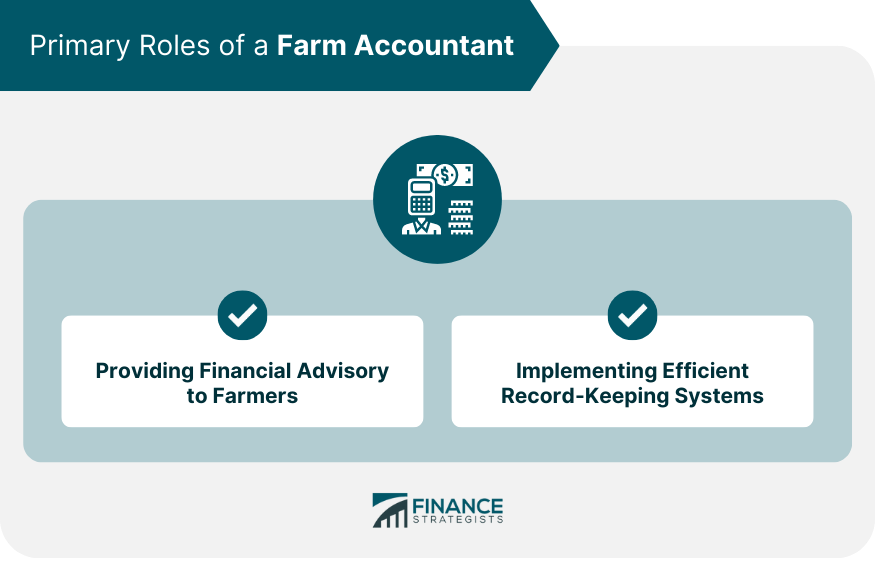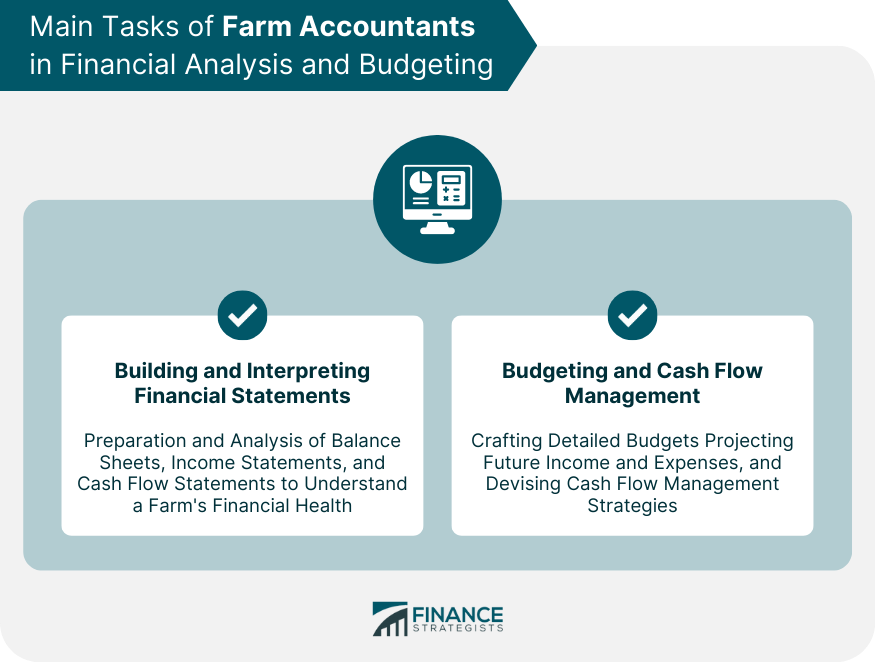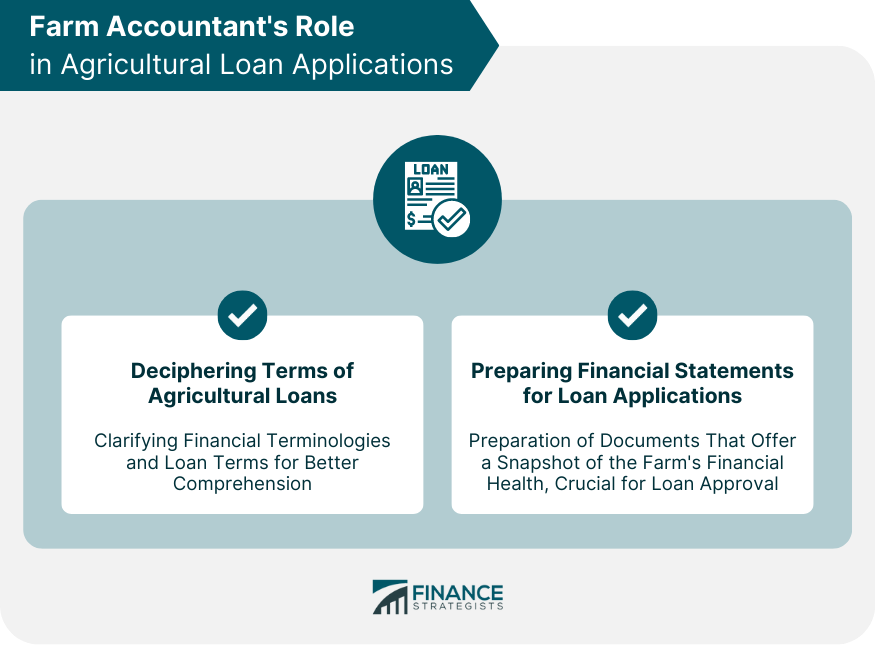A farm accountant is a professional who specializes in handling the unique financial needs of agricultural businesses. This role requires deep knowledge of accounting principles but with a particular focus on aspects specific to the farming industry. A farm accountant keeps track of farming transactions, ensures accurate and timely bookkeeping, and comprehends depreciation and amortization techniques for farm-specific assets. They are instrumental in tax planning, identifying tax deductions exclusive to the agriculture sector, and optimizing farm income to minimize tax burdens. Farm accountants also play a crucial role in preparing financial statements for agricultural loan applications, conducting farm business valuations, and facilitating succession planning. Their broad understanding of the financial intricacies of farming operations makes them a vital partner for farmers, ensuring the financial health and sustainability of the farm. Navigating the realm of agriculture is akin to journeying through an intricate labyrinth. The farm accountant, endowed with financial acumen, emerges as a trusty guide in this challenging journey. They use their expert knowledge to unravel the complexities of farm economics, providing sound advice to farmers. Their guidance, anchored in a deep understanding of financial analysis, illuminates the path to profitability and sustainability for farming operations. Farm accountants can be thought of as financial interpreters. They decode the often intimidating jargon of finance, transforming it into understandable, practical advice for farmers. This expertise enables them to simplify complex financial data and convert it into clear, actionable strategies. Through their guidance, farmers are able to grasp the economic implications of various farming approaches, making informed decisions that directly impact the financial health of their farms. Crafting a well-thought-out financial plan with the assistance of a farm accountant can boost farm profitability and fortify its resilience in the face of fluctuating economic conditions. Just as a strong foundation is essential to a sturdy building, meticulous record-keeping is fundamental to successful farm management. Farm accountants are skilled in establishing comprehensive record-keeping systems that accurately track and report all income and expenses. These systems, like a financial journal of farming operations, provide an ongoing picture of the farm's financial health. Farmers, through these systems, can identify trends, anticipate future costs, and assess the effectiveness of their farming practices. In the competitive world of farming, precise record-keeping could mark the difference between a farm that merely survives and one that truly thrives. A firm grasp of farm accounting principles is crucial to effective farm management. Among these principles, understanding depreciation and amortization and maintaining accurate farm bookkeeping stand out as critical components. Farm bookkeeping, the bedrock of farm accounting, involves accurately recording all financial transactions associated with farming operations. It encompasses all income from crop sales and other farm-related sources, as well as all farm expenses. Regular and accurate bookkeeping allows farmers to monitor their finances continually, ensure stable cash flow, and make data-driven business decisions. A thorough understanding of depreciation and amortization concepts is also crucial in farm accounting. Depreciation and amortization distribute the cost of tangible and intangible assets over their lifespan, affecting the farm's bottom line. Familiarity with these concepts helps farmers strategize future capital investments and measure the economic impact of their asset utilization. Farm accountants play a pivotal role in tax planning, which significantly impacts a farm's profitability. The agricultural sector provides various unique tax deductions. Farm accountants aid farmers in leveraging these deductions, offering clarity on how they can significantly reduce their tax liabilities. This process involves analyzing and applying tax advantages related to farming expenses, such as soil and water conservation measures, farming equipment purchases, and livestock maintenance. Strategic tax planning is a valuable tool for optimizing farm incomes. By planning deductible expenses and timing income recognition, farm accountants help to reduce a farm's tax burden significantly. Effective tax planning ensures efficient cash flow management, thereby fostering the farm's long-term financial stability. Farm accountants extend their role beyond tax planning to financial analysis and budgeting, shaping a farm's financial future. Preparing and interpreting financial statements is a key role of farm accountants. These documents, which include balance sheets, income statements, and cash flow statements, provide an in-depth view of a farm's financial health. They highlight the farm's assets, liabilities, income, and expenditure, helping farmers identify financial trends, growth opportunities, and potential financial hurdles. Budgeting and cash flow management are crucial elements of successful farm operations. Farm accountants lend their expertise in crafting detailed budgets that project future income and expenses. At the same time, they devise cash flow management strategies to ensure the farm can meet its financial obligations while maintaining financial resilience in unexpected circumstances. Agricultural loans often provide essential financial support for farms. In this context, farm accountants play an invaluable role in simplifying loan applications. Farm accountants help demystify the complexities of agricultural loans for farmers. They clarify complicated financial terminologies and offer clear explanations of loan terms. With a farm accountant's guidance, farmers can confidently navigate the lending landscape and select loan options that best align with their financial capabilities and business goals. Preparation of financial statements is another crucial task that farm accountants handle. These documents offer a snapshot of the farm's financial health and play a significant role in the lender's decision to approve or deny a loan. By showcasing the farm's financial strengths, farm accountants enhance the farm's chances of securing essential financial support. During significant events like selling a farm or planning for inheritance, accurately assessing the farm's value is crucial. A farm accountant's expertise is invaluable in this process. Farm accountants can provide an accurate estimation of a farm's value, crucial when planning for a sale or inheritance. They consider all tangible and intangible assets, including land, buildings, livestock, and farming equipment, providing a comprehensive picture of the farm's worth. Valuing livestock and farming equipment forms a substantial part of a farm's overall valuation. Farm accountants employ a variety of methods to estimate the value of these assets. This detailed assessment ensures a comprehensive and accurate valuation, facilitating fair sales and equitable inheritances. The farm accountant plays a crucial role in the complex process of succession planning, guiding the farm through this critical transition. The first step in succession planning is identifying potential successors. Farm accountants can facilitate this process, ensuring a fair and transparent selection that aligns with the farm owner's wishes. Once successors have been identified, planning for a smooth transition becomes paramount. This process involves comprehensive financial planning, equitable asset distribution, and, potentially, training for the successors. With the farm accountant's guidance, farms can navigate this process more smoothly, ensuring a successful transition to the new generation of farm management. Farm accountants are specialists who cater to the unique financial needs of agricultural enterprises. Their roles span the spectrum of financial management, from day-to-day bookkeeping and developing efficient record-keeping systems to offering strategic financial advice and performing tax planning. Equipped with a deep understanding of farm accounting principles, they facilitate comprehension of concepts like depreciation, amortization, and income tracking. This proficiency enables informed decision-making that contributes to a farm's profitability and resilience. A significant aspect of their work also involves farm business valuation. By assessing the worth of tangible and intangible assets, they provide a comprehensive estimation of a farm's value, critical during sales or inheritance planning. The role of a farm accountant, therefore, goes beyond typical accounting to encompass a wide range of responsibilities instrumental to the sustainable growth of the agricultural sector.Who Is a Farm Accountant?
Primary Roles of a Farm Accountant
Providing Financial Advisory to Farmers
Implementing Efficient Record-Keeping Systems

Farm Accounting Principles
Farm Bookkeeping: Tracking Income and Expenditure
Depreciation and Amortization in Farm Accounting
Tax Planning in Farm Accountancy
Navigating Agriculture-Specific Tax Deductions
Optimizing Farm Incomes Through Effective Tax Planning
Farm Accountants in Financial Analysis and Budgeting
Building and Interpreting Financial Statements
Budgeting and Cash Flow Management in Farming

Farm Accountant's Role in Agricultural Loan Applications
Deciphering Terms of Agricultural Loans
Preparing Financial Statements for Loan Applications

Farm Accountants and Farm Business Valuations
Estimating Farm Value for Sales or Inheritance
Assessing Value of Livestock and Farm Equipment
Succession Planning and the Farm Accountant
Identifying Potential Successors
Planning for a Smooth Transition
Final Thoughts
Farm Accountant FAQs
The core principles of farm accounting include accurate bookkeeping of all farming transactions and understanding depreciation and amortization of assets.
Farm accountants help in identifying agriculture-specific tax deductions and optimizing farm income to reduce tax liabilities.
Farm accountants help decipher loan terms and prepare crucial financial statements necessary for loan application approvals.
Farm accountants estimate the value of all tangible and intangible farm assets, including livestock and farming equipment, for sales or inheritance purposes.
Farm accountants help identify potential successors and plan for a smooth financial and operational transition, ensuring the farm's sustainability.
True Tamplin is a published author, public speaker, CEO of UpDigital, and founder of Finance Strategists.
True is a Certified Educator in Personal Finance (CEPF®), author of The Handy Financial Ratios Guide, a member of the Society for Advancing Business Editing and Writing, contributes to his financial education site, Finance Strategists, and has spoken to various financial communities such as the CFA Institute, as well as university students like his Alma mater, Biola University, where he received a bachelor of science in business and data analytics.
To learn more about True, visit his personal website or view his author profiles on Amazon, Nasdaq and Forbes.











